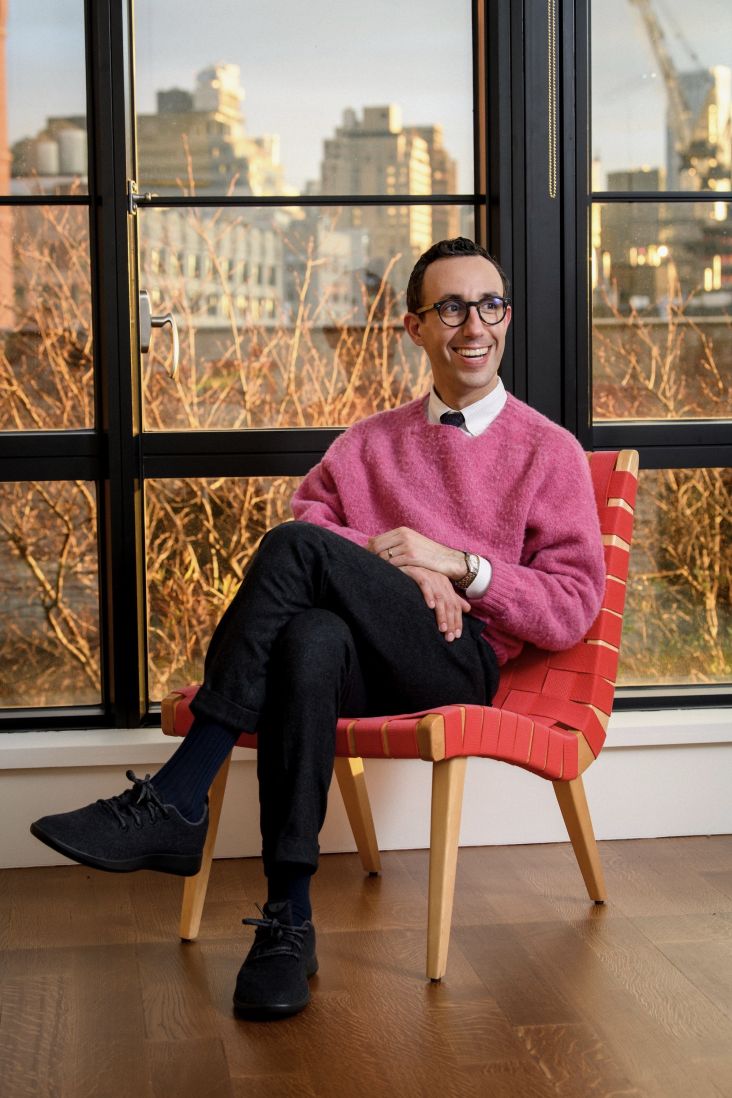Robot Food on why awards are a dangerous addiction that agencies need to avoid
We all love design awards, right? Well, if the reaction to a recent LinkedIn post is anything to go by, apparently not. We chat to Leeds agency Robot Food to find out what they have against them.

Simon Forster. Photo by Joanne Crawford
For the 15th consecutive year, Leeds-based branding and creative agency Robot Food has not won a single prestigious industry gong, such as a D&AD Pencil or DBA Design Effectiveness trophy. But rather than being a source of embarrassment or disappointment, it's a point of pride.
"It's awards season and I'm delighted to announce that Robot Food hasn't been shortlisted for any design awards, as we still haven't paid to enter any," founder and executive creative director Simon Forster pithily wrote on LinkedIn. "To mark this achievement and to put profits to better use, we're donating £1,000 each to five charities instead."
The post caused a big stir, with hundreds of reactions from agency peers expressing admiration for Robot Food's stance. To gauge how representative this was, we held our own poll and the results couldn't have been clearer.
When asked, "Do you think awards truly add value?" only 12.6% of you agreed, while a massive 87.4% of you replied, "Nope, awards suck".
There are clearly many people who don't like creative awards right now. So, I spoke to Simon, along with managing director Dave Timothy and creative director Ben Brears, to find out more.
Some bullshit
You can see in the faces of Simon, Dave and Ben how delighted they are by the positive reaction their LinkedIn post received. "We've resonated with a lot of people who feel the same way," says Simon. "Lots of people are liking and reacting to it because they feel there's some bullshit going on."
He's referring to the paid-entry model of most major industry awards, which require agencies to pay hefty fees to submit their client work for consideration. In return, winners earn trophies and the right to brand themselves as 'award-winning' for marketing purposes.
"It's a brilliant business model for the awards organisers," concedes Dave. "Because essentially, these awards are outdated as soon as they give them out. You have to keep winning more year after year just to keep that prestigious title. Which means agencies have to keep paying year after year."
For smaller agencies, though, the costs of entering enough categories to be competitive can be prohibitive.
Simon recalls an early conversation that shaped Robot Food's stance on this issue. "Our first employee Martin Widdowfield, who's now a creative director, said to me, 'Why don't we enter awards?'" he recalls. "And I said, 'Well, you do realise you have to pay?' And he just went, 'Fuck off!' That was the end of the conversation."

Dave Timothy. Photo by Joanne Crawford

Photo by Joanne Crawford

Ben Brears
"Another agency counted themselves at the time as the most effective agency in the world because they won more Design Effectiveness Awards than anyone else," Simon continues. "They also happened to sit on the board of the DBA [the Design Business Association, which organises the awards]. And basically, their whole business development strategy was to be this prolific award-winner. But if we'd entered, we wouldn't have had the ability or money to enter as many categories as them and really play that game. It felt farcical to us."
Distorting the process
And it's not just about unfairness. Robot Food believes that working to win awards fundamentally affects how you approach client work. "If we were aiming at awards, it could hamper the type of work we're able to do because we might be doing it for designers rather than clients," Simon believes.
As an example, he points to Robot Food's recent rebranding for Danish beer brand Tuborg. "Our brief was to attract a younger audience because their core drinkers were ageing," he says. "But as an organisation, they were so conservative, so worried about change."
Rather than a splashy redesign, Robot Food made very modest visual updates that brought in new younger consumers while keeping existing brand loyalists. "It worked phenomenally well," he recalls. "But it's not the kind of big ripping up and starting again that I think designers would see as award-worthy work."



And therein lies the rub. Who are we trying to impress here: the awards judges or the clients? No doubt it's possible to do both, but it's natural to lean into the former.
"If there's a type of work that's winning awards, the temptation might be to start shooting for that, even if it's not right for the brand," Dave argues. "Some design awards attract a style of design that an agency could gear their project work toward, rather than actually delivering for the client's objectives."
Drain on resources
Dave notes a similar dynamic in other industries. It's well known, for example, that The Oscars reward certain types of movies. That's why Barbie got short shrift from the Academy this year, despite its huge popularity, while few were surprised to see Oppenheimer clean up. It was the kind of film that "had Oscars written all over it".
Similarly, in the agency world, Dave feels: "You have to create a certain kind of design work to win awards, which doesn't necessarily translate to being effective in the real world."
It can also be a drain on resources. "I've worked in agencies where they had full-time people dedicated to awards," says Ben. "This entire role was improving the case studies in order to win awards. The investment they had to make, just for the sake of a shiny trinket on a shelf, was ridiculous. We'd rather reinvest any potential awards budget into our internal team. So in the past, we've given £250 to each member of the team to give to a charity in lieu of administering an award."
Standing apart
And what, really, is the point of awards? "It's actually quite a homogenous thing, isn't it?" says Simon. "There's no differentiation: agency A's got a gold award, and agency B's got a gold award. So, what is the USP of those agencies? What sets them apart? Ironically, for us, not doing it at all is the thing that makes us stand out."




So why do so many agencies value awards? "It's a systemic thing," believes Ben. "It's definitely taught at universities. Oh, you need to enter this award because it'll give you the best chance, and you're just brought up on that. You have to do this to be a good designer. You have to get this award. It's like smoking: you just don't question it until somebody comes down and says: 'Why the fuck are we doing this?'"
Some may argue that winning an award can help energise and validate team members. But Ben believes there are other ways to do that.
"We involve the team throughout the process, and if the regular designers have a great idea, we'll try to let them present it to the client as well. It's never just me as creative director taking credit for everything. It's about the team and empowering them to own the work and develop it, rather than just being like a small cog in a machine."
Differing priorities
For all the talk of industry clout and marketing advantage agencies claim in paying to enter awards, the team at Robot Food says client feedback and lasting partnerships are ultimately what they care about.
"We're working with clients we've partnered with for nine, ten years, and they'll take us with them wherever they go next," says Dave. "To us, that's the biggest validation you could ask for as an agency. The client praise, the longevity of those relationships, that's what really means something; not being able to call ourselves award-winning."

Photo by Joanne Crawford

Photo by Joanne Crawford
While some may see this as stubborn or contrarian, Simon feels it's simply applying the critical thinking that Robot Food prides itself on to all aspects of its work.
"It delivers bad business results if you just follow the herd mentality and don't question things," he argues. "Most things come down to ego, don't they? If you can avoid the lure of ego and make decisions based on what's truly best for your clients, your team and your business values, you're probably on to something… with or without award validation."
"We try to take away anything that's not needed and not over-complicate things," adds Ben. "We just think about what will be most useful and effective for each client's situation. That's simplicity, but it's also good design."

























